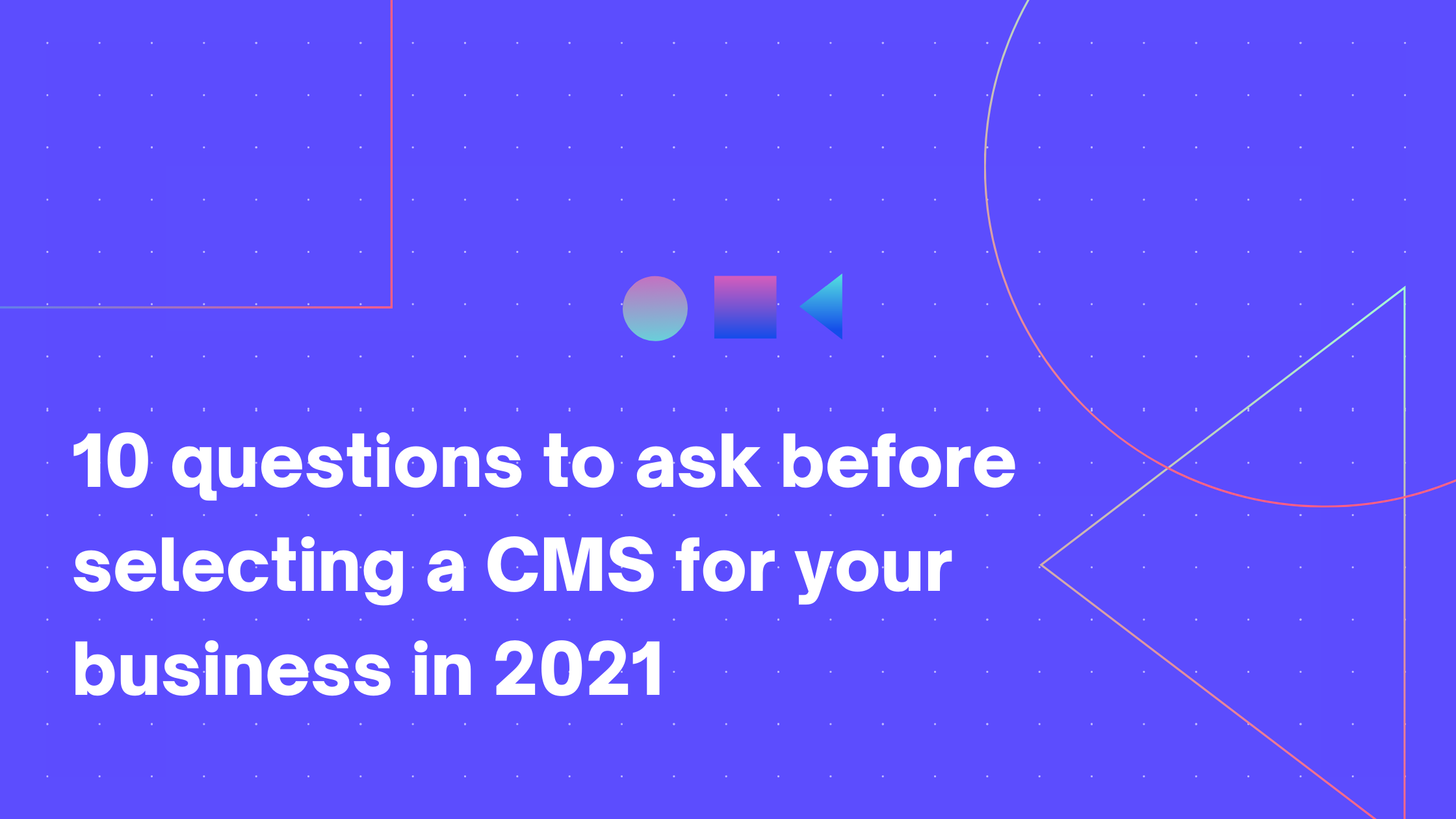
 6-minute read
6-minute read
A Content Management System (CMS) is software that allows you to create and manage content on the website, such as design, graphics, and coding. This is not a small challenge, and you should not overlook it. The CMS you choose should be able to develop and evolve over the years. In addition, the CMS is provided by various distribution networks, and it should be in a position to work with data exchange tools, like an API. A good CMS aims to enhance the digital experience by allowing successful cross-platform data exchange and other applications. A content management system efficiently keeps your content up-to-date and does not involve the hassle of coding.
Let us have a look at the 10 questions you should keep in mind before choosing a CMS for your enterprise.
1. How Will the CMS Leverage Your Existing Tools?
A CMS helps manage the web experience without bringing in technical expertise. It enables built-in security compliance for content creation, management, administration, publishing, and distribution. A CMS-powered site paves the way for a variety of user engagement possibilities for an enterprise. These systems are trusted for their out-of-the-box features; hence advertisers have these available since day one of starting a business.
2. Are There Exceptions to What content Can Be Managed?
The CMS includes a central content hub from where users can upload, edit, and update web content without the help of developers. Editors can publish their content to any digital application, including websites, apps, signage, wearable tech, etc. CMS gives ease of usage to developers and editors and allows them to work independently of each other.
3. What Features Support a Good User Experience for Editors and Developers?
A good Content Management System allows for:
- Flexible and structured editing.
- Automation to speed up content editing and web development.
- Contextual training through the user interface.
- Collaborative planning.
These four features of a CMS enhance the digital experience and results in happier, empowered, and intuitively guided editors and developers.
4. How Does the CMS Enable You to Reach New and Emerging Markets?
By integrating the capabilities of the CMS with public engagement, you can divide the entire audience and target them based on their location, interests, subscription status, etc. This will help you create a fully customized user experience. A CMS allows businesses to track clients' experience by giving full control over content—be it news, opinions, data analytics, or advertising.
5. What Competitive Advantages Will We Gain in Terms of Speed?
Since 2010, speed has become a ranking factor on Google, and users try to seek responses instantly to their questions. The backend is another angle to consider performance. While the main bottleneck for performance has shifted to front end content, it remains a hurdle for every website owner to deliver the assets. Speed can give you an edge above the rest by providing means to transform your organization digitally and create a unified digital experience for the audience.
6. Factors Behind the Successful Implementation?
The team is important. The best people must be invited to the project at the right moment. Management of programs, IT architects, designers, developers—every essential function should be taken care of. Users also play a critical role in the implementation of a CMS; they are the ones who keep the website up to date. The five Ds of successful implementation of this CMS are – Discovery, Design, Definition, Development, and Deployment. If these five Ds are included properly, then the implementation is right on track.
7. Can You Start Small and Scale Up Once the CMS Proves Itself?
The potential of a Content Management System stays hidden until you implement it. Once you start implementing it, you will understand whether the CMS is performing as expected or if you have to use a different approach. Start small to avoid the risks of long implementation times before you commit to it completely.
8. What Is Your Vision for the Future of Content Management?
The future of content management lies in the content infrastructure. A CMS should be looked into as a solution to increase the speed and still be efficient enough to grasp. With the ever-evolving times, the lines between structured and unstructured information are getting blurred, and the convergence of social and cloud infrastructure is developing exciting content value propositions for the consumer market.
9. What Value Does it Offer Beyond Just Solving Existing Problems?
Upgrading to a CMS means bidding goodbye to existing problems; it paves the way for new opportunities to shape the content infrastructure and open up a myriad of avenues for your business. It will be based on how the customers respond to current requirements and how the content management systems prepare themselves.
10. How Does This Solution Think Outside the CMS Box?
A CMS provides an out-of-the-box offering and customized open-source customizable platform by allowing a flexible content architecture, easy content authoring, a wide ecosystem of integrations, an active community to ensure security and highly scalable content.
Lastly, before finalizing a CMS, make sure that the framework is well-researched and the CMS is credible. It should be accessible, operational, and priced appropriately. Choosing the right CMS is not easy, a lot of research and preparation goes into the process. The only way to find the perfect CMS is to keep a note of your requirements and set criteria for it.
Any thoughts on the 10 FAQs while choosing the right CMS for your business? We'd be glad to hear what you have to say!


